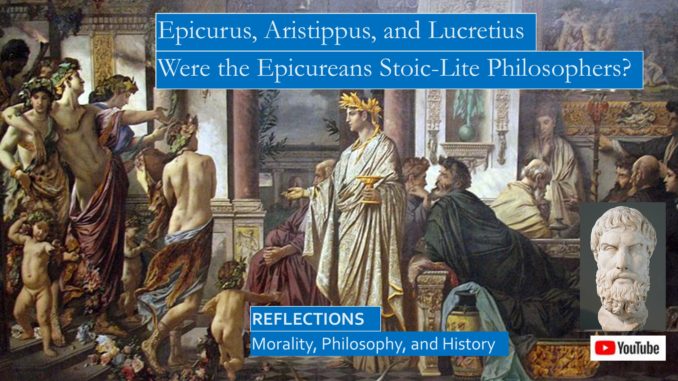
To encourage the study of moral philosophy, the Stoic Emperor Marcus Aurelius provided Roman public funding for the four schools of philosophy in Athens, the schools for Platonic Philosophy, Aristotelian Philosophy, Stoic Philosophy, and Epicurean Philosophy. Though there was sniping between these schools of philosophy, namely the Stoic Philosopher Epictetus constantly rails against the hedonism of the Epicureans, these were not like mutually exclusive traditions, they borrowed heavily from each other. All four of these schools had their roots in philosophers who studied under Socrates, so he was indeed a Father of Moral Philosophy. Cicero tells us when he sent his nephew to study philosophy in Athens to spend six months studying in each school of philosophy, so he could absorb the best in each school.
This blog adds to the observations in my prior blog on this topic:
http://www.seekingvirtueandwisdom.com/was-epicurus-really-a-stoic-lite-philosopher-were-all-epicureans-hedonists/
Please view our YouTube video for this blog: https://youtu.be/49Qv3Be86Jw
YouTube script for more book links: https://www.slideshare.net/BruceStrom1/epicurus-aristippus-and-lucretius-were-the-epicureans-stoiclite-philosophers
Epicurus himself was a moderate, stoic-lite type of philosopher, his predecessors, Aristippus and the other Greek philosophers of the Cyrenaic School, as well as many of the later Roman Epicurean philosophers were more hedonistic, with a more selfish philosophy that cared less about the well-being of their neighbors. The modern successors to the Epicureans were the Utilitarian philosophers.
ARISTIPPUS, FOUNDER OF THE CYRENAIC SCHOOL OF PHILOSOPHY
In Cyrene, Aristippus became acquainted with the teaching of Pythagoras, and later became a student of both the Sophists and Socrates in Athens in the fourth century BC. Like Epicurus and Seneca, the philosophy of Aristippus was influenced by the wealth and luxury of the upper classes into which he was born. Was his hedonism part performance? The historian Will Durant says that that “the blunt hedonism of Aristippus was in part due to his delight in scandalizing the respectable sinners of the town.” He shares this desire to scandalize with our friends the Greek Cynic philosophers, but not the Roman Stoic philosophers, who take life more seriously.
According to the scholar Copleston, Aristippus adopted the Sophist view that it is “our sensations alone that give us certain knowledge.” “Subjective sensations, then, must be the basis for practical conduct.” Aristippus reasoned, “If my individual sensations form the norm for my practical conduct, then the end of conduct is to obtain pleasurable sensations.” Seeking pleasure is the goal of the Cyrenaic School of Philosophy founded by Aristippus.
Will Durant says it best, “Whatever we do, according to Aristippus, is done through hope of pleasure or fear of pain, even when we impoverish ourselves for our friends, or give our lives for our generals.” Unlike Epicurus, who seeks to maximize pleasure in the long run, Aristippus is more interested in today’s pleasures. “The art of life lies in plucking pleasures as they pass, and making the most of what the moment gives.”
Copleston states, “Socrates declared that virtue is one path to happiness, and he held out that virtue is the one path to happiness, but he did not maintain that pleasure is the end of life. Aristippus, however, seized the one side of Socratic teaching and disregarded all the rest.” Many of his successors suggest that “the wise man will, in his choice of pleasure, be cognizant of the future,” which leads to a less selfish and more loving philosophy.
Cicero tells us that one of his successors, Hegesias, lectured so much about how life was so miserable and how impossible it is to truly seek happiness that some of his students committed suicide out of despair. In response the authorities ordered him to quit lecturing on such a despairing philosophy.[1]
After the founding of the Epicurean school of philosophy there was debates between the Cyrenaics and the Epicureans, but over time the Cyrenaic school died out, in effect merging with the Epicurean school.
LIFE AND PHILOSOPHY OF EPICURUS
Epicurus was born at Samos several generations after Socrates, and moved to Athens first to serve in the military and then studied at the Academy before founding his own school of philosophy. Epicurus willed his house and garden to his students to continue his studies, and he freed his slaves in his will.
Was Epicureanism a cult? Or perhaps we should ask, was Epicureanism like a philosophical fraternity? One prominent scholar, AA Long, suggests that Epicurus’ school of philosophy was more a philosophical community centering on personal friendship than it was a formal school of philosophy. Many ancient philosophers wrote about the virtues of friendship, but the virtues of friendship are core to the Epicurean experience, and the Epicureans sought pleasure through their friendships. This community was egalitarian, it was one of the few in ancient world that admitted women and slaves, and in his letters, Epicurus expresses deep affection for his friends and followers. AA Long says this, “those who committed themselves to Epicurus we not so much students ‘reading for a course’ as men and women dedicated to a certain style of life.”
Epicurus was accorded near-divine by his students during his lifetime, many of his sayings were learned by heart by his students. Seneca says their motto was, “Act always as if Epicurus is watching.” The Platonic, Aristotelian, and Stoic schools of philosophy encourage their students to think independently, to think for themselves, so they can advance the study of philosophy. But since Epicureanism developed around the personality of Epicurus, his disciples treasured his teachings like they were religious teachings that needed little modification.
Some scholars describe Epicureanism as a missionary philosophy, where disciples found Epicurean communities in several cities, including Antioch and Alexandria. Quoting AA Long, “the adherents of Epicurus regarded him as ‘savior’, as the bringer of ‘light,’ words we more commonly associate with Judaism and Christianity.”[2]
Epicurus was learned his physics from Democritus, learned the wisdom of pleasure from Aristippus, and learned the pleasure of wisdom from Socrates. Will Durant tells us that Epicurus lived unobtrusively, “in Stoic simplicity and prudent privacy,” “content with water and a little wine, bread and a little cheese.” Although Epicurus “took part dutifully in the religious rituals of the city, he kept his hand clear of politics, and his spirit free from the affairs of the world.” Copleston observes, “Epicurus concentrated on Ethics even more than did the Greek Stoics, declaring science and mathematics useless, since they had no connection with the conduct of life.”
Copleston identifies three core criteria in philosophical system of Epicurus, Perception, Concepts, and Feelings. Perception is what we observe with our senses, that is the basis for our individual understanding of truth. Concepts are the memory images of our perceptions. To Epicureans, concepts are, by definition, always true, we encounter issues of truth or falsity when we formulate opinions or judgments based on these concepts. Under this system, “feelings are criteria for conduct. The Greek Stoics adopted this idea of concepts. Finally, the feeling of pleasure is the criterion of what we should choose, and the feeling of pain shows us what we should avoid.”
Epicurus does not deny the existence of the gods, he denies that they care about the affairs of men, the gods are distant and are so ignorant of the affairs of men that men need not fear the gods, or so Epicurus says. The Greek gods are like men, they breathe and eat and feel as men do. Likewise, Epicurus rejects the notion of the immortality of the soul, he does not believe there is life after death, which he gives as a reason not to fear death, since there is no judgment and no punishment after death, or so he says. In particular, Epicurus objects to the view that astronomical phenomena are caused by the gods.
As Copleston notes, Epicurus says that “Men may honor the gods for their excellence and may even take part in the customary ceremonial worship, but all fear of them is out of place, as is all attempts to win their favor by sacrifices. True piety consists in right thought.” AA Long observes, “Epicurus regarded belief in the gods as a prime source of human anxiety.”
What distinguishes Epicureanism from other philosophies? AA Long observes, “for Plato and Aristotle happiness the source of happiness is virtue, excellence of ‘soul’,” as expressed in how you live your life. “But for Epicurus virtue is necessary to happiness not as an essential ingredient but as a means to its attainment.” Virtue leads to pleasure, but pleasure is the goal, AA Long quotes from Epicurus, “we say that pleasure is the beginning and end of living blissfully, for pleasure is a good which is primary and innate. From pleasure we begin every act of choice and avoidance. It is to pleasure that we return, we use our experience of pleasure as the criterion of every good thing.”
We may condemn Epicureanism in comparison it to the more morally rigorous Stoicism, and this condemnation is well deserved, but we must also realize that this perfectly sums up the American obsession of living for the weekend so we can spend time with our friends and loved ones. Or maybe a modest Epicureanism can be a type of Stoicism-Lite, the spiritual danger is that we could underemphasize the importance of virtue in our lives.
Perhaps Epicurus himself recognizes this danger of his philosophy. Aristippus takes the short view of pleasure, while Epicurus takes the long view. AA Long quotes Epicurus, “Since pleasure is the good which is primary and innate, we do not choose every pleasure, sometimes we pass over pleasures if their consequence is greater pain.” For example, Epicurus is not fond of hangovers, so he drinks in moderation. “And we regard many pains as superior to pleasures when a greater pleasure arises for us after we have put up with pains over a long time.” For example, we suffer the pains of education so months or years later we can earn more than the minimum wage. And, although every pleasure seems to be good, “not every pleasure is to be chosen, and not every pain is bad.”
AA Long states, “although Epicurus regarded the virtues as means and not as ends, he held that they are necessary to happiness and are inseparably bound up with the hedonist life.” And he quotes Epicurus, “Of the sources of pleasure, the starting-point and greatest good is prudence. Therefore, prudence is more valuable than philosophy. From prudence the other virtues arise. Prudence teaches that it is not possible to live pleasurably without living prudently, nobly, and justly. Nor can you live prudently, nobly, and justly, without living pleasurably.”
Prudence often leads to happiness, but how can you say that pleasure is contingent for prudence? This can only be so when you define pleasure as the heavenly joy for those who truly love their neighbor, living selflessly, not living a selfish life. But Epicurus always talks about our selfish pleasures, he never defines pleasure as a heavenly joy. Epicurus never talks about the need to love our neighbor, no matter who they may be. Were the Epicurean communities truly egalitarian, or did they evolve into social clubs for wealthy citizens? We can ask the same question of our churches, are they truly egalitarian communities, or are they social clubs for middle and upper class citizens?
Will Durant says this of the positive aspects of the Philosophy of Epicurus: “The wise man does not burn with ambition or lust for fame, he does not envy the good fortune of his enemies, or even of his friends; he avoids the fevered competition of the city and the turmoil of political strife; he seeks the calm of the countryside and finds the surest and deepest happiness in tranquility of body and mind.” Copleston notes that when Epicurus talks about the positive aspects of pleasure that he does not mean “the pleasure of the moment, but the pleasure that endures throughout a lifetime. Also, pleasure for Epicurus consists of the absence of pain rather than positive satisfaction.” Also, “Epicurean hedonism does not result in libertinism and excess, but in a calm and tranquil life; for a man is unhappy either from fear or from unlimited and vain desires, but when he bridles these desires, the wise man secures for himself the blessings of reason.” “Virtue is this tranquility of the soul.” “The wise man can be happy even when he is tortured on the rack,” a saying of Epicurus that is more stoic than epicurean.
Will Durant says that the profoundest defect of Epicureanism “is its negativity: it thinks of pleasure as freedom from pain, and of wisdom as an escape from the hazards and fullness of life; it provides an excellent design for bachelorhood, but hardly for a society.”[3] Stoicism teaches implicitly, and Christ and the Church Fathers teach explicitly, that the core of our faith is our two-fold Love of God and our neighbor. Epicurus seems to says this implicitly, but his over-emphasis on pleasure is too easily misunderstood by those who seek approval to live for short-term selfish pleasure.
Although he lived several centuries after Epicurus, the Philosophy of Lucretius does not deviate from that of Epicurus. Lucretius is known both as a poet and as an Epicurean Philosopher.
UTILITARIANS AND EPICUREANS
In an essay in the Appendix of the leading English translation of the Lives of Eminent Philosophers by the ancient Diogenes, Anthony Grafton describes how Thomas More, the Utilitarian Philosopher, was inspired by Epicurean Philosophy in his novel, Utopia. Grafton notes that, like the Epicureans, “the Utopians have their own religion and philosophy. They hold that humans should pursue pleasure; in particular, the permanent pleasures of the mind and soul, though they do not look down on the pleasures of the body. By doing so, they argue, one can achieve salvation.”[4] This attitude assures the hostility of devout and serious Christian believers and clergy, just as Epictetus was hostile towards Epicurus.
[1] Frederick Copleston, The History of Philosophy, Greece and Rome, Volume 1 (New York: Doubleday, 1962, 1993), Minor Socratic Schools, The Cyrenaic School, pp. 121-123; and Will Durant, The Story of Civilization, Part II, The Life of Greece (New York: Simon and Schuster, 1939, 1966), The Zenith of Philosophy, pp. 503-505.
[2] AA Long, Hellenistic Philosophy, Stoics, Epicureans, Skeptics, 2nd Edition (Berkeley: University of California Press, 1974, 1986), pp. 14-17.
[3] Frederick Copleston, Greece and Rome, Epicureanism, pp. 401-412; Will Durant, The Life of Greece, The Zenith of Philosophy, pp. 644-649; AA Long, Hellenistic Philosophy, pp. 41-43, 61-69. AA Long is quoting from Epicurus, Epistle to Menoeceus, 128-132.
[4] Anthony Grafton, Diogenes Laertius: From Inspiration to Annoyance and Back, in Appendix of the work by Diogenes Laertius, Lives of Eminent Philosopher (), p. 549.

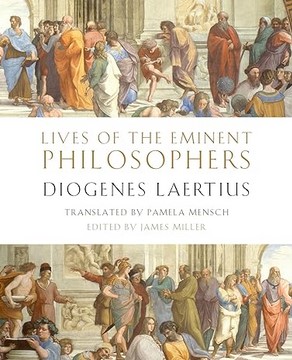
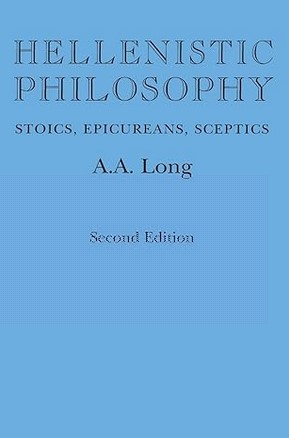
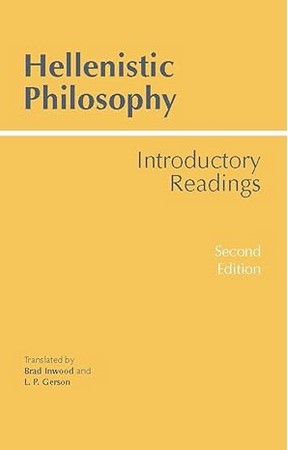
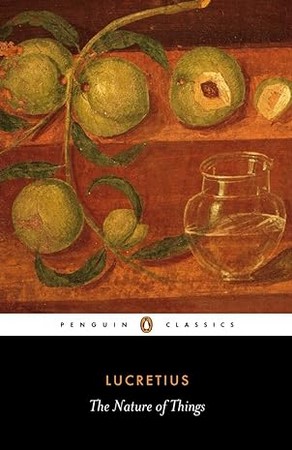
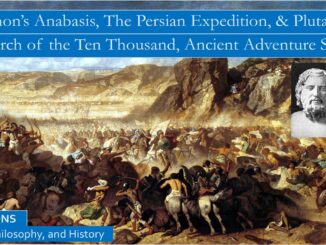

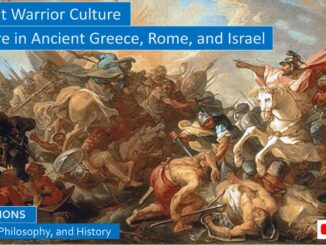
6 Trackbacks / Pingbacks